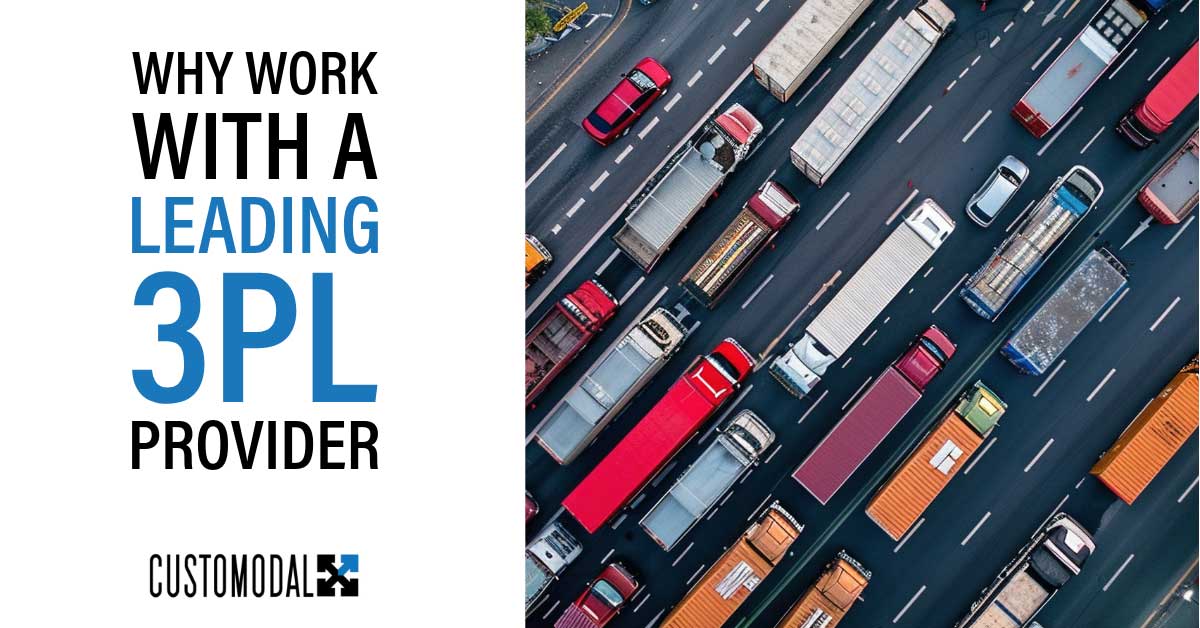
It can be confusing when you try to determine the difference between 3PL vs 4PL vs Freight Forwarder in the transportation industry. Then you have to understand why they are both different from freight forwarders. It is important that you understand the difference between all three so that choose the right type of provider for your needs.
What is the difference between 3PL vs. 4PL vs. freight forwarder? Freight forwarders arrange multi-modal transport of goods between locations on behalf of clients. 3PLs source and arrange services from transportation to warehousing and many things in between on behalf of a client. 4PL’s manage the activities of 3PL’s on behalf of their client coordinating efforts in alignment with strategic goals.
There are distinct characteristics between all three, but they are there to help ease the burden of any logistics with shipments and supply chains. There is more to learn about what they can all do separately.
The Difference Between the “PL’s”
Some suggest that these terms…3pl vs 4pl vs freight forwarder…can be used at any moment because somehow, they seem like one and the same. But they really are different. Here’s how:
- 1PL – In this scenario, a manufacturer delivers their goods themselves (think “in-house”).
- 2PL – Here a manufacturer hires a motor carrier or trucking company to transport goods. Sometimes referred to as “outsourcing” transportation.
- 3PL – The 3PL sources and manages transportation, warehousing, and other services on behalf of the manufacturer. So the manufacturer is the 1st party, the transportation or warehouse provider is the 2nd party and the 3rd party logistics provider coordinates, sources & executes.
- 4PL – In this scenario, the 4th party transitions to strategic roll and coordinates the various 3rd party providers to meet the manufacturers strategic objectives.
- 5PL – Here the manufacturer has outsourced the entire operation of their supply chain. The 5PL handles everything from strategy to tactics employing the use of any number of other resources that may include motor carriers, 3PL’s and 4PL’s.
With this start on 3pl vs 4pl vs freight forwarder, lets dig deeper.
3PL – Third-Party Logistics Company
A 3PL takes care of all the logistics of a client’s business and are commonly used by small to medium-sized businesses for their experience, knowledge and skills. The client business retains control of their supply chain strategy and it’s overall operation but relies on the resources, network , and technology of the 3PL by outsourcing logistics and transportation. Many 3PL’s can, If you need, take care of most every function within your supply chain.
3PL providers are usually able to handle the following:
- Finds a carrier, arranges transportation, provides proof-of-delivery
- Keeps inventory and warehoused goods intact
- Packs shipment
- Invoices your clients
Using a 3PL allows you to focus on other parts of your company. You’ve essentially hired an expert to handle the transportation and logistics function freeing you to focus where your skills and impact are greatest. Many of the best-run companies in America, private or publicly-traded, employ this same strategy of “Focus on our core competencies and outsource the rest” to outgrow their competitors.
4PL – Fourth-Party Logistics Company
Since we now understand that employing a 4PL means you already work with one or more 3PLs, it makes sense that 4PL’s are more commonly used by larger or more complex businesses. While some 3PL’s may operate assets (ie trucks), all 4PL’s are non-asset. 4PL’s do not operate assets because their essential role is to engineer and manage multiple service providers to achieve the client businesses strategic supply chain goals. Not having assets improves their ability to be neutral between carriers and aligns the 4PLs interests with what is best for the client business, logistics service level and value of the products shipped.
There is an overabundance of services that they provide:
- They manage and plan out your inventory
- Handle order entry and customer service
- Audit and analyze transportation expenses
- Measure performance of carriers and 3PLs
- Stage inbound shipments in coordination with production planning
- Develop and adhere to a logistics strategy
- Help with business planning
4PL’s helps you better maintain and control your supply chain. While the client company sets the overall supply chain goals and strategy, the 4PL provider will assemble an outsourced portfolio of 2PLs and 3PLs to handle the many logistical tasks needed to achieve smooth operation of the supply chain.
Typically, the 4PL will serve as the only point of contact between you and your vendor or customer. Since 4PL providers manage a large function within your business; common values and a good partnership are critical.
So…What is Freight Forwarder?
Freight forwarders are a unique blend between a 2PL and 3PL from our definitions above. First, they specialize in shipments that require more than one mode of transportation. Next , they use a combination of their own assets as well as coordinating and contracting other transportation providers to knit together a complete shipment. An international export shipment provides an example:
- Truck picks up shipment in Toledo and hauls it to the Detroit airport (Ground Mode)
- Shipment flies from Detroit to Tokyo (Air Mode)
- Truck collects shipment from airport and takes it to the port (Ground Mode)
- Shipment rides on the ferry to Nagasaki (Ocean Mode)
- Truck collects shipment from ferry terminal and delivers to customer (Ground Mode)
Having your shipment go through multiple modes of transportation to get to the destination location, is the everyday job of freight forwarders. They have access to source carriers that will transport your products via:

- Air transportation
- Ground transportation
- Railroad
- Ocean and Inland waterway
A freight forwarder’s main objective is the transportation of shipments and nothing else.
A freight forwarder brings you the following benefits:
- Gives you the opportunity to track any inland transports
- Prepare and ship important documents
- Aids in insurance claims
- Arrange freight charges that are best for you
- Helps with freight consolidation
Since freight forwarders are in the shipping business, they are able to gain access to shipping discounts that you would not be able to receive. Freight forwarders are able to give you rates that are acceptable for their services as well.
Now that you know the difference between the three providers, you can now determine which one will work best for your company.
3PL vs 4PL vs Freight Forwarder – Choosing the Right One
When faced with the 3pl vs 4pl vs freight forwarder choice for your business, picking and choosing the right provider can be a tough call. This is where you must do your homework to determine what your business needs to function optimally. Remember, you only need to choose the ONE that best meets your needs.
3PL May Be Best for You

When considering a 3PL as your choice, begin with a look at your own in-house resources. If your business does not have the resources, or better yet, if your business can use it’s in-house resources more effectively on other functions choose a 3PL provider.
Many 3PL providers will give you the opportunity to select from common bundles of services or even to select service by service “a la carte”. Pick and choose, experiment until you settle on the mix that provides the best result for your business. And, as you continue to grow, you can keep adding on services. In many cases, businesses using 3PLs save between 5% to 25% on shipping costs.
And don’t forget to think about your warehouse and distribution centers when considering a 3PL. Many 3PLs have warehouses in different domestic locations to help with your fulfillment needs. Some even have warehouses internationally. By having warehouses, it makes it cheaper for you to hire them than to purchase or rent a warehouse on your own.
Other common 3PL services users rate highly include: shipment visibility, managed transportation, freight damage claim filing and having someone to solve problems occurring in-transit.
Picking a 4PL Company
Picking a 4PL provider is great for companies that are seeing a fast influx in customers. This means that your company is growing bigger and you will need help to balance your services. If you have enlisted the help of one or more 3PLs, a 4PL can optimize what they do, because they are essentially the overseer of everything in your supply chain.
4PL providers help your business with:
- Costs: Having your logistics outsourced as well as your transportation can lead to higher savings.
- Production level: With a 4PL provider that has experience dealing with bigger businesses, they can see to it that everything runs smoothly enough. This lets you focus on other functions within your business.
- Open book: 4PLs try not to keep things away from you. They show you everything that is being done, but it may be harder for you to still see everything that goes on if they outsource a specific service.
- Control: Giving a little control to 4PLs, lets them lead the way on making sure you are getting the best use out of your inventory and shipping processes.
4PLs are operated by humans, but this provider rarely makes mistakes. Their entire operation thrives on data analysis and collection. The accuracy of this data is how they are able to optimize a supply chain to give their client’s the best service available.
When they look at the logistics of your company and the data they have collected, they will advise you to take away services that are not helping your company in any way.
Why You Need a Freight Forwarder
You must do your research on the freight forwarders you will be considering. You should take these next steps when searching for a freight forwarder:
- Gathering information: Have all of your logistics and services down before you contact a freight forwarder. This means, how much product you have or the number of shipments you make. This will help guide your searches when looking for a provider to help grow your company.
- Licenses and permits: With each freight forwarder you research, find out if they have the appropriate documents to handle your shipments. This information should be available to the public.
- How is their communication? Can you contact them when you have questions? They should provide tracking information with shipments and notifications so that you can follow along.
- Handling risks: Will the freight forwarder that you choose be able to help with harsh traveling conditions? Your provider needs to help with cargo insurance to reduce any accidental costs.
Even though these providers seem like a one-trick pony, they can remove several burdens from you. Taking care of the logistics of your shipments is enough work in itself. A great freight forwarder has the know-how of how to handle:
- Documents that are needed for certain requirements
- Procedures
- The cost of transportation in any medium
As you are doing your research, look for a freight forwarder that has a long history of paying attention to detail when it comes to transporting shipments. They will understand your strengths and weaknesses as a business as time goes on. This could pose as a great business partner relationship for the future and a sound investment opportunity.
You can agree on a contract together that talks about any concerns you may have over pricing. This allows for you both to understand what services will be charged or fixed with a general rate of increase (GRI).
If you have a lot of shipments that are being transported internationally, freight forwarders should be your first choice. A freight forwarder takes care in understanding the following that comes with shipping to other countries:
- Shipping companies
- Documents
- Different laws
They are there to help you and your resources with domestic and international knowledge of shipping procedures to ensure that each guideline is met precisely. There are freight forwarders who do business to business (B2B) shipping.
Freight forwarders can assist with taking your shipment to your client’s front door if you wish them to. If this is a benefit you wish to use, this service includes:
- Shipping important documents.
- Having all of the arrangements for the carriers that will have to deal with packing and storage of the product.
The service above does more than just let your freight forwarder ship your product. This service will allow them to make sure that the shipment ends up in the right hands instead of just dropping them off in your client’s warehouse and calling it a day.
Disadvantages of Picking a Logistics Provider
All three types of logistics providers have good services that you can benefit from. To make a great decision for your business you also need to look at each one’s cons. There are some disadvantages to choosing one over the other.
3PL Disadvantages
Since 3PL providers outsource all or some of their services, this means that those services are done out of your line of sight. This makes it harder for you to see the day to day operations of that service.
Even though 3PL providers take care of any problems that happen with your shipments, if your customer is not satisfied, they will blame you. They do not see this as a problem with the 3PL, they see this as a problem with your business.
Be clear when researching, as there are 3PLs that handle domestic only, international only, or both domestic and international service. So, if you know you will need international logistics services, you will need to ask that question when you contact them.
Lastly, the cost may change from what you initially agree upon. The cost will be less expensive overall, but as time progresses and services are added, you may see an increase in costs.
4PL Disadvantages
With 4PLs being the main point of contact between you and your customers, it may be hard to turn over that control to them. Your relationship with your customers is based on the logistical process that the 4PL uses.
An established 4PL provider has years of experience under their belt. However, with that experience comes a tilt towards their favorite vendors and suppliers that they like to use. The 4PL may choose a specific vendor instead of one that would work best with you.
Unfortunately, 4PLs are more expensive than 3PLs. This means small businesses and startups should stay away until they have enough revenue and clients to back up their hiring of a 4PL.
Freight Forwarder Disadvantages
If something happens to your shipment on the way, they are not going to be held liable for what happens. This is because they are only seen as the middleman between you and the carriers. So, choose a freight forwarder who has a shipping process you can stand behind.
Should any miscommunication develop between you and the freight forwarder, this will affect many shipments that are fulfilled. Entering in the wrong data for a shipment that will be carried overseas, can cause a huge headache. If you and the freight forwarder do not understand what needs to be shipped, this can cause weeks of delay for your customer that could ruin a relationship.
The cost of a freight forwarder can be unknown because they could be charging you more for each separate service. Remember to research the average prices for shipping products with different types of transportation. This gives you an idea of how much you should be paying for their service.
Speaking of costs, there are peak season surcharges that happen during crunch time. Freight forwarders will increase rates if their carrier partner is charging more for the limited space they have on their transport to carry a shipment. This happens each year in July when imports from China ramp up destined for the United States in time for Christmas store shelves.



